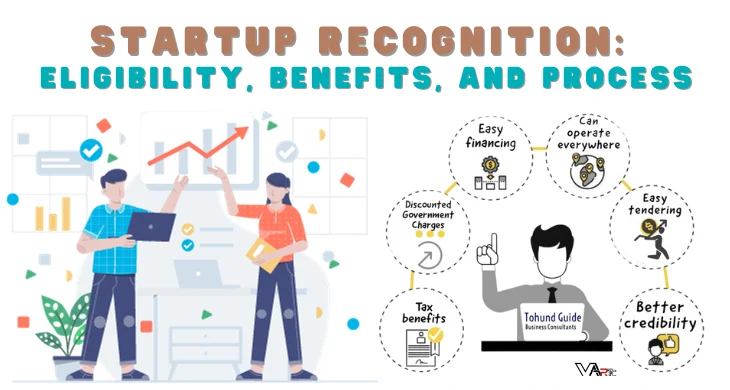A startup is a fresh business venture, typically small in scale, initiated by either an individual or a group of entrepreneurs. What sets startups apart from other businesses is their introduction of a novel product or service that isn’t currently available in the same form elsewhere. Startups are fundamentally driven by the principles of modernization and innovation. These enterprises are characterized by their commitment to creating new products or services or enhancing existing ones to offer improved solutions to the market.
Description:
Startup India is an initiative launched in 2016 by Prime Minister Narendra Modi with the primary objective of fostering entrepreneurship. This comprehensive action plan encompasses several key goals, including the promotion of bank financing for startups, streamlining the startup registration and incorporation processes, and offering a range of tax incentives to newly established startups. However, it’s important to note that all these benefits and exemptions are accessible to startups only if they meet the specific criteria defining an ‘Eligible Startup.’
Eligibility Criteria for Startup Recognition:
To qualify for startup recognition, an enterprise must meet the following conditions:
- The enterprise can be recognized as a startup for a duration of up to ten years from its date of incorporation. This applies to private companies as defined in the Companies Act, 2013, limited liability partnerships (under the LLP Act, 2008), or partnership firms registered under Section 59 of the Indian Partnership Act, 1932.
- The entity’s turnover since its incorporation should not exceed one hundred crore rupees for any of the previous financial years.
- The entity must be engaged in activities related to innovation, product/process development, or service enhancement. Alternatively, it should have a scalable business model with the potential to generate substantial employment and wealth.
- The entity must be newly established, or if it is registered through a restructuring or renewal process of an existing entity, it will not qualify for startup status.
Benefits of Startup India Recognition in India:
Neusource Startup Minds India Limited offers comprehensive company registration services in India. Our team comprises experts from various fields who can provide guidance and support throughout the entire process of establishing a startup company in India. Based on your business model, we recommend the most suitable type of company registration and assist you through the Startup India company registration process from beginning to end.
Startup recognition is an initiative by the Government of India, and it brings several advantages, including:
- Promotion of Startups: Startup India recognition promotes the growth and development of startups.
- Job Creation: It contributes to the generation of employment opportunities.
- Wealth Creation: It fosters wealth creation within the startup ecosystem.
Additionally, under the Startup India Scheme, recognized organizations can access various benefits, including tax incentives, simplified compliance procedures, expedited intellectual property rights processing, and more.
Our services are available across India, with branches in Delhi, Lucknow, Mumbai, and Hyderabad. At Neusource Startup Minds India Limited, our goal is to establish a world-class startup ecosystem in India that identifies, nurtures, and supports modern-age startups created by Indians for the global market. We collaborate closely with governments, academia, and industries to assist young entrepreneurs in building and scaling world-class startups.
A startup is defined as an entity that is both incorporated and registered in India.
The Startup India initiative was launched in 2016 under the leadership of Prime Minister Narendra Modi with the aim of fostering entrepreneurship. This comprehensive plan encompasses several key objectives, including the promotion of bank financing for startups, streamlining the startup registration and incorporation processes, and providing various tax incentives to newly established startups. However, it’s important to note that all these benefits and exemptions are accessible to startups only if they meet the specific criteria defining an ‘Eligible Startup.’
Process of Startup Recognition:
The process of recognizing an eligible entity as a startup is as follows:
- Online Application: Begin by submitting an online application through the designated portal for startup recognition.
- Application Documentation: Along with the application, provide a copy of the business registration certificate and offer a detailed description of the nature of your business. This description should highlight what makes your product or process unique and how it contributes to economic growth.
- Review and Recognition: Upon receiving all the necessary details and documents, the competent authority will assess the application. If they find that the provided documents are sufficient and meet the criteria, they will grant recognition to the entity as a startup. However, there is also a possibility of rejection if the authority deems it necessary.
Procedure for Tax Exemption Application After Recognition by DIPP:
Here’s the step-by-step process for applying for tax exemption after being recognized by the Department of Industrial Policy and Promotion (DIPP):
- Startup India Portal Registration: Start by signing up on the Startup India portal and create your login credentials.
- Startup Recognition Application: Submit an application for startup recognition, which is a prerequisite for requesting tax benefits. Upon successful validation and approval of your application, you will receive a “Certificate of Recognition” along with a unique DIPP number.
- Tax Benefit Application (Section 80-IAC): After obtaining the Certificate of Recognition, eligible startups can apply for tax benefits under Section 80-IAC online. The application will undergo evaluation based on criteria such as uniqueness, innovation, scalability, and sector significance. A “Technical Agency” will assess the case and present it in the next board meeting. If clarifications are needed before this stage, the application will be sent for resubmission, and queries will be communicated via email. Each startup has up to three chances for resubmission, including the initial application.
- Approval by Inter-Ministerial Board (IMB): Upon approval by the IMB, consisting of various officials, the startup will receive a “Certificate of Eligibility,” or the application may be rejected.
- ITR Filing: To claim exemption, enter the DPIIT number, startup application details, and other tax benefit certificate information in your Income Tax Return (ITR).
This process enables eligible startups to apply for and secure tax benefits as part of the Startup India initiative.
Mandatory Documents for Startup Recognition:
To achieve startup recognition, you must provide the following essential documents:
- Certificate of Incorporation or LLP Registration Certificate with PAN Card Copy: Submit a copy of your certificate of incorporation or LLP registration certificate along with the PAN card details.
- Memorandum of Association or LLP Agreement Copy: Include a copy of the memorandum of association or LLP agreement.
- Company Details and Product/Service Information: Furnish brief details about your company and the products or services you offer.
- Director and Authorized Representative Profile: Provide a brief profile of your directors and authorized representatives, including email IDs, contact details, and addresses.
- Annual Accounts: Submit the annual accounts of your startup for the past three financial years.
- Income Tax Returns: Include income tax returns for the last three financial years.
- Website and Social Profile: Provide the URL link to your website and links to your entity’s social media profiles.
- Mobile App Link or Relevant Business Video: If applicable, include a link to your mobile app or any video related to your business product.
- Trademark, Patent, or IPR Filing Details: Include any trademark, patent, or other intellectual property rights (IPR) filing numbers and logo information (filed or registered).
These documents are necessary for the startup recognition process.
https://www.startupindia.gov.in/content/sih/en/registration.html
FAQS:
Q1: What is startup recognition, and why is it important in India?
A1: Startup recognition is a government initiative in India that acknowledges and supports innovative businesses. It’s crucial as it provides various benefits, including tax exemptions, funding opportunities, and easier regulatory compliance, which can significantly boost a startup’s growth and success.
Q2: Who is eligible for startup recognition in India?
A2: To be eligible, a startup must meet specific criteria, including being incorporated as a private company, LLP, or partnership firm. It should have been established within ten years of the application and have a turnover below INR 100 crore in any previous financial year.
Q3: What are the benefits of startup recognition in India?
A3: Benefits include a 3-year tax exemption in a block of seven years, exemption from long-term capital gains tax, and relief from the angel tax. Startups also gain access to funding, easier compliance procedures, and faster Intellectual Property Rights (IPR) approvals.
Q4: How can I apply for startup recognition in India?
A4: You can apply through the Startup India portal by providing necessary documents such as the certificate of incorporation, details about your business, and annual accounts. The application will be reviewed by the relevant authority, which will decide on your startup’s recognition.
Q5: Is there a timeline for tax exemptions after startup recognition?
A5: Yes, a startup can avail a 3-year tax exemption within the first seven years from its incorporation date. This exemption can be a significant financial advantage during the initial growth phase.
Conclusion:
Startup recognition in India opens up a world of opportunities for innovative entrepreneurs. The eligibility criteria are clear, and the benefits, including tax exemptions, are significant incentives. The process, while thorough, is designed to support and promote startups. By understanding these aspects, aspiring entrepreneurs can embark on their journey with confidence, knowing that they have the support of the government to help them thrive and make a lasting impact on the business landscape. So, if you have a groundbreaking idea and the passion to pursue it, startup recognition might just be the key to your entrepreneurial success.

